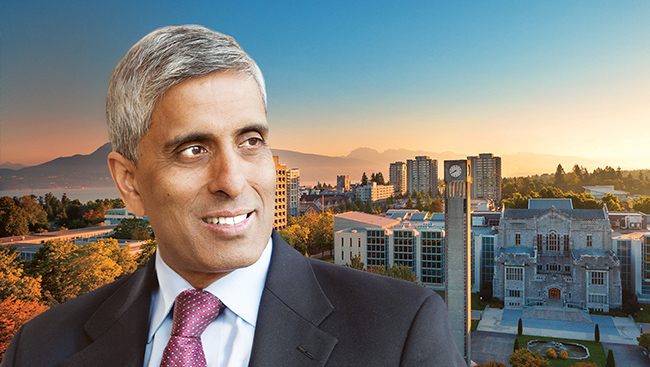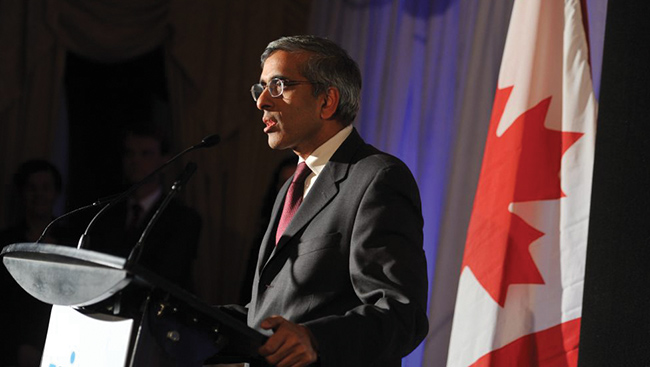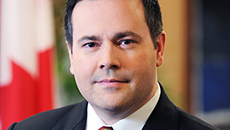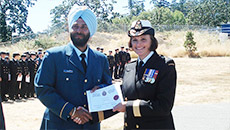Earlier this year, Dr. Gupta was named the 13th president and vice chancellor of the University of British Columbia. Not only is Gupta a “renowned expert in research and innovation policy forging close collaborations between universities, civil society and business,” but he is the first South Asian to hold this coveted position overseeing one of the leading universities in the world.
The University of British Columbia not only has some of the most beautiful campuses in the world, but it is also consistently ranked among the 40 best universities in the world. Recognized as a global centre for research and teaching, UBC’s Vancouver and Okanagan campuses are home to 58,284 students; 10,181 international students from 149 countries; and 15,171 faculty and staff. In 2013 alone, the university granted 10,546 degrees. Furthermore, the university attracted $519 million for the research funding of 8,158 projects, and 158 companies have spun off from UBC research. Overall, the university annually contributes $12.7 billion to the BC economy.
In March 2014, the UBC Board appointed Dr. Arvind Gupta the 13th president and vice chancellor of the University of British Columbia. Not only is Gupta a “renowned expert in research and innovation policy forging close collaborations between universities, civil society and business,” but he is the first South Asian to hold this coveted position overseeing one of the leading universities in the world.
“As a member of the UBC community, I know how great a responsibility and honour this is,” says Gupta. “I have the privilege of taking the baton from Professor Toope, who has guided UBC to a strong position. We have exciting days ahead and I relish the opportunity.”
Essentially the president acts like the chief executive officer of the university, and Gupta will oversee UBC’s $2 billion annual operating budget. He succeeded Professor Stephen Toope, who completed his service on June 30. Gupta became president on July 1 for a five-year term, while retaining his position at UBC as professor of computer science, which he has taught since 2009.
“I was delighted to hear Dr. Gupta will be succeeding me,” said Stephen Toope. “In him, UBC has found a leader with rare attributes: critical thinking, inspiring vision and the courage to chart a bold course.”
Previous to being appointed President, Gupta held the post of executive officer and scientific director of Mitacs, a not-for-profit organization “recognized internationally for nurturing the next generation of research and business-savvy innovators”. With its headquarters at UBC, Mitacs is a joint project between 60 universities with 24 offices across Canada, and Gupta has led the organization since 2000.
“Dr. Gupta is well regarded in academic, private and public sectors. His recent work at Mitacs – partnering with government and pairing academia with industry in the pursuit of commercialization and knowledge transfer – has been very positive for local industries, universities and especially for students,” said Minister of Advanced Education, Amrik Virk. “I trust that he will bring the visionary leadership and management required to lead a large, complex organization as UBC.”

The Man Behind The Vision
Gupta was born in Jalandhar, Punjab and immigrated with his family to the United States when he was 5 years old. His father was an inorganic chemist and professor, who taught at Wayne State University in Detroit. The family moved from Detroit to Wisconsin, before settling in Timmins, Ontario when Gupta was 7 years old.
Gupta grew up in Timmins, a city in northeastern Ontario, which is also where Canadian superstar Shania Twain was raised. Gupta’s father settled his family in Timmins, as he oversaw a pollution lab for a mining company. Gupta attended McMaster University in Hamilton, where he completed his undergraduate degree. He earned his PhD from the University of Toronto in 1991.
That same year, he moved to British Columbia and was a professor at Simon Fraser University from 1991 to 2009. He joined the UBC faculty in 2009 as professor of computer science.
Recognized as an expert in science and innovation policy, Gupta has strived to create partnerships and collaborations between civil society and universities. “Gupta’s research expertise is in combinatorial algorithms with applications to fields such as bioinformatics, which utilizes computer science to better understand genetics,” as per UBC.
Over the last few decades, Gupta has been involved in a number of councils and boards, including the Government of Canada’s Science, Technology and Innovation Council; the Australian Mathematical Sciences Institute; the Banff International Research Station; the Canadian Statistical Sciences Institute; the Canadian Mining Innovation Council; Mprime Network and Mitacs; and the International Scientific Advisory Board of GRAND-NCE.
According to UBC, Gupta speaks frequently on research and innovation policy across Canada with public, private and academic audiences. “He is a regular contributor to the national dialogue through opinion editorials on international collaboration and recruitment, international competitiveness, innovation and productivity.”
Gupta further explains, “I’ve been focused on how universities can be leaders in the Canadian innovation space…we have a productivity challenge in Canada, productivity numbers are not where they should be. The question for government is: What can they do to boost productivity?
“One of the key ways is to foster more innovation – sparking new and better ideas for solving society’s issues, whether it’s economic, social or both. I’ve been really involved for many years in thinking about how to make Canada more innovative and what the university’s role should be. Because we’re all about ideas, about producing people who are innovative, universities have got to be central in Canada’s innovation debate and so that’s what I’ve been doing. The boards that you see me on are really focused on that.”
A great example of this, Gupta was appointed to a six-member expert panel to review federal government support to industrial research and development in 2010. “The report and recommendations of that panel, entitled ‘Innovation Canada: A Call to Action,’ have had a significant and ongoing impact on government innovation policy,” as per UBC.
He is married to Dr. Michelle Pereira, a family physician, and they have three daughters. The eldest resides in Toronto and is a teacher. Another daughter has just completed her undergraduate science degree and is planning to study law in September. The third daughter is currently studying at UBC in the pharmacy program.

Initial Reaction
Learning of his appointment as UBC’s 13th president and vice chancellor, Gupta reflects on his initial reaction saying “I was in shock, and I think there were a few reasons. The main reason is that I’ve never really been involved in high-level university administration. I run Mitacs so I do have some administrative experience, but not in a high level role in university administration and I was very upfront with the selection committee when they were interviewing me. I’ve built research initiatives I thought were necessary for the universities in the country, but I knew I would face a steep learning curve. I was surprised, but pleasantly surprised. With these types of things, you’re not 100 per cent sure what your chances are especially if you don’t have a background which is the norm for these types of positions. It took my wife and I a couple of days to really digest the offer.”
Our conversation turned to his two daughters, who attended UBC, and what their reaction was to the appointment. “I think now they’re used to it, but the first day they weren’t sure exactly how to react. They were very happy for me and really excited and they came to the announcement.” He goes on to joke, “They’re also getting used to what it means, I think there are days where they would like to make sure that nobody knows, and they want to be normal UBC students. And there are days when someone mentions it to them, and they’re really proud.”
Gupta shares a great story. His middle daughter is graduating next year, and in his new role, he will be conferring degrees to students at the convocation ceremony. Naturally, his daughter wondered what the process would be, so she asked him “How’s it going to work when I convocate [graduate]? So do I shake your hand, am I allowed to hug you?”
Despite the transition, Gupta says the family is really excited and it will be a new adventure for them. They will be living on campus, and Gupta explains “There will be a lot of interesting people coming through the house.”

The Vision
Getting to know Dr. Arvind Gupta was a lovely experience, he is not only a brilliant individual with a remarkable vision for UBC and its students, but he is also dedicated to enriching the student experience in today’s constantly evolving world.
“For me the heart and soul of the university is the students,” he says. At Mitacs, his focus was centered around the student experience with the question – how do we enrich the student experience? – at the forefront. He goes on to say, “So that’s something that I’m really passionate about: creating better opportunities for our students. How do we get better outreach for our students?”
According to Gupta, “the world is changing in a pretty fundamental way” and he points out that boundaries, such as geographical and knowledge based are disappearing. For example, individuals no longer have to reside in a country, where their business is located, but can run it from afar and students can access technology at the click of a button, challenging concepts and information in real time.
“With these shifting boundaries, I think universities are going to become increasingly integrated with their communities. And we need to think about how that’s happening and we need to think about our role in this evolving nature of society, it’s a kind of globalization. It’s really about information, the availability of information and the way we access information. Some people call it democratization of information. So if we have to think about the role of universities and for students, who are brought up in this new way of thinking about the world, they are going to be challenging us to think about the educational paradigm and how they learn and how we teach them. I’m really interested in these types of issues.”
In addition, another aspect of Gupta’s overall mandate is the student experience – “How do we create that experience that gives them the tools to be successful lifelong?” He continues, “We are all shaped by experiences that we have. We need to start thinking about how we can create very enriching experiences for our students, both on and off campus. For my education, I came to school, went to classes, I learned things, and then in the summer, I would get a job off campus. But I think that’s changed and we need to think about how we truly build partnerships with the outside world. I think if we get those partnerships right, our students will have a much more enriching experience.”
He would like to see Canadian students travel to other countries resulting in international opportunities and partnerships, or interacting with groups or organizations off campus “in a way that enriches their learning experience. Students are the in best position to help us with these things, so I’m really looking forward to working with the students on some of those things.”

Giving Back To The Next Generation
Following in his father’s footsteps, Gupta embarked on a career path in which he would impart knowledge to the next generation. He discusses his role as a professor and the importance of giving back and sharing knowledge from one generation to another.
“Our role as parents, as citizens of society, is to think about the next generation and how we’re producing great citizens. Great citizens have many different facets to them – they’re critical thinkers, volunteer in their communities, engage in civil debate, participate in democracy, bring up great kids, get jobs and pay taxes. We have all these different facets to us. Universities have a special place in this because we get young people in their most formulative years, essentially the latter part of their teenage/early 20’s. They’re starting to shape their political and social views. So we have to think very carefully at universities because society is trusting us with these young people and we need to make sure that we [are] producing great citizens.”
Gupta says he is “very privileged to be a professor” and to have the opportunity to work with students. “In my new role I can do a little bit of the shaping. That’s what I’ve always enjoyed as a professor and I think that’s the part that I’m really going to enjoy
To conclude, he says “I actually think the role of each generation is to think about the next generation. Otherwise, we’re too limited as human beings. It can’t just be about us, we always have to think about what we’re giving to the next generation, and that’s how we make society a better place. And we have made society much better. If you think about all the social changes that have happened in Canada in the last 50 years, we’re much better off in terms of giving to the next. That’s what universities are fundamentally about. How do we make sure that we create a better society for the next generation and more enriching place for learning.”

Conclusion
“I think Canada is an amazingly inclusive place, and we as a country have done a remarkable job leveraging the talent of people who come here – that’s the strength of this country,” says Gupta. “Maybe the fact that I’m from India will inspire young people of South Asian descent to pursue higher education.”
He shares a story to capture this notion, “At Mitacs, we have a summer program, where students from around the world come to Canada. A young man from India said to me, ‘I’ve done research projects in all sorts of countries, but after a week I felt at home in Canada.’ That communicates what is really special about this country. We work so hard to have this sense of inclusiveness. It’s real and genuine, we really welcome the world to Canada.”
Dr. Arvind Gupta is an inspirational figure, who sets a precedent for others that through hard work, determination, innovation and academia, you too can achieve your dreams of creating a better world one step a time.






